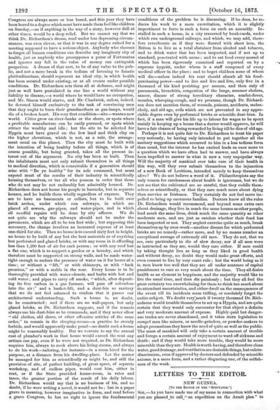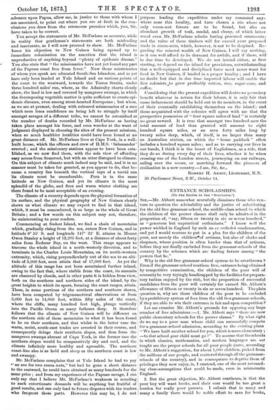LETTERS TO THE EDITOR.
NEW GUINEA.
(TO THE EDITOR OF THE SPECTATOR."
SIR,—As you have made use of my name in connection with what you are pleased_to call.," an expedition on the Armit plan" to
advance upon Papua, allow me, in justice to those with whom I am associated, to point out where you are at fault in the con- clusions you draw from the erroneous premises which, you, Sir, have taken to be correct.
You accept the statements of Mr. McFarlane as accurate, while in reality that gentleman's statements are both misleading and inaccurate, as I will now proceed to show. Mr. McFarlane bases his objection to New Guinea being opened up to immediate colonisation on the assertion that the island is unproductive of anything beyond "plenty of epidemic disease." You also state that " the missionaries have not yet found any part .of the Papuan coast free from fever." Now these missionaries of whom you speak are educated South-Sea Islanders, and as yet have only been landed at Yule Island and on various points of the coast to the westward, towards the Torres Straits, under 'three hundred miles' run, where, as the Admiralty charts clearly show, the land is low and covered by mangrove swamps, in which the decomposing vegetable matter is quite sufficient to create epi- demic diseases, even among stout-hearted Europeans ; but when, as we are at present, dealing with coloured misssonaries of a race which soon loses confidence on being left to struggle by itself amongst savages of a different tribe, we cannot be astonished at the number of deaths recorded by Mr. McFarlane as having taken place amongst his force, and even wonder at the want of judgment displayed in choosing the sites of the present missions, when so much healthier localities could have been found at no great distance off. Mr. McFarlane lives at Cape York, in a well- built house, which the officers and crew of H.M.S. Salamander' erected ; and the missionary stations appear to have been este- hlished, as we now find them, with the sole view of affording easy access from Somerset, but with an utter disregard to climate. On this subject of climate much indeed may be said, and it in no manner must be taken for granted, as you appear to do, that be- cause a country lies beneath the vertical rays of a torrid sun its climate must be unendurable. Peru is in the same latitude as New Guinea, and yet its climate is the most splendid of the globe, and fires and warm winter clothing are there found to be most acceptable of an evening.
The climate of a country depends upon the physical formation of its surface, and the physical geography of New Guinea clearly shows us what climate we may expect to find in that island, which, it must be remembered, is as large as the whole of Great Britain ; and a few words on this subject may not, therefore, he uninteresting to your readers.
Commencing at Sudest Island, we find a chain of mountains -which, gradually rising from the sea, enters New Guinea, and in latitude 8° 55' S. and longitude 147° 33' E. attains in Mount Owen Stanley a height of 13,205 feet, at a distance of about forty miles from Redscar Bay, on the west. This range appears to traverse the whole island in a north-westerly direction, and to terminate in the Charles Louis Mountains, on its north-western 'extremity, which, rising perpendicularly out of the sea to an alti- tude of 5,000 feet, soon attain that of 17,000 feet. As yet the altitude of this range has not been ascertained further inland, -owing to the fact that, where visible from the coast, its summits are obscured by clouds, and in other parts it is hidden from view, both on the southern and northern sides of the island, by the great heights to which its spurs, forming the coast ranges, attain. These, in some portions of the northern and southern shores, have been computed by trigonometrical observations at from -5,000 feet to 14,000 feet, within fifty miles of the coast, where the cliffs, many hundred feet high, plunge vertically -into the Pacific Ocean as many fathoms deep. It therefore follows that the climate of New Guinea will be different on the northern side of these mountains to what it has been found to be on their southern, and that whilst hi the latter case the -warm, moist, south-east trades are arrested in their course, and consequently deluge their southern slopes, and thus form the mangrove swamps abreast of Cape York, in the former case the northern slopes would be comparatively dry and cool, and the climate infinitely more healthy and agreeable. The northern coast-line also is as bold and steep as the southern coast is low and swampy.
Mr. McFarlane complains that at Yule Island he had to pay 4' an axe for two cocoa-nuts," but had he gone a short distance to the eastward, he could have obtained as many hundreds for the same price ; and from my experience of the Papuan savage, I can only say that I believe Mr. McFarlane's weakness in acceding to such extortionate demands will be anything but fruitful of good results, and can only lead to future disputes with the traders who frequent these parts. However this may be, I do not
purpose leading the expedition under my command any- where near this locality, and have chosen a site where not only cocoa-nut forests are to be found, but also an abundant growth of teak, sandal, and ebony, of which latter wood even Mr. McFarlane admits having procured ornaments; and the value of these timbers will far exceed your proposed trade in cocoa-nuts, which, however, is not to be despised. Re- garding the mineral wealth of New Guinea, I will say nothing, as it can well afford to lie dormant for awhile, and if there, will in due time be developed. We do not intend either, at first starting, to depend on the island for provisions, notwithstanding that a well-equipped and disciplined force need never want for food in New Guinea, if landed in a proper locality ; and I have no doubt but that in due time imported labour will enable the first colonists,to grow profitably cotton, rice, sugar-cane, and coffee.
Considering that the present expedition will derive no pecuniary benefit whatever in return for their labour, it is only fair that some inducement should be held out to its members, in the event of their eventually establishing themselves on the island ; and those acquainted with the colonies will agree with me that the prospective possession of " four square miles of land " is certainly no great reward. It is true that amongst two hundred men the total amount of land thus granted will amount to eight hundred square miles, or an area forty miles long by twenty miles deep, which, of itself, is no larger than many an Australian station, on which the " home paddock " often includes a hundred square miles ; and as to carrying our lives in our hands, I think it is the boast of Englishmen, as a rule, that they do so during every day of their lives, whether it be when crossing one of the London streets, journeying on our railways, sailing over the ocean, or marching forward the pioneers of civilisation in a new country.—I am, Sir, &c.,



































 Previous page
Previous page